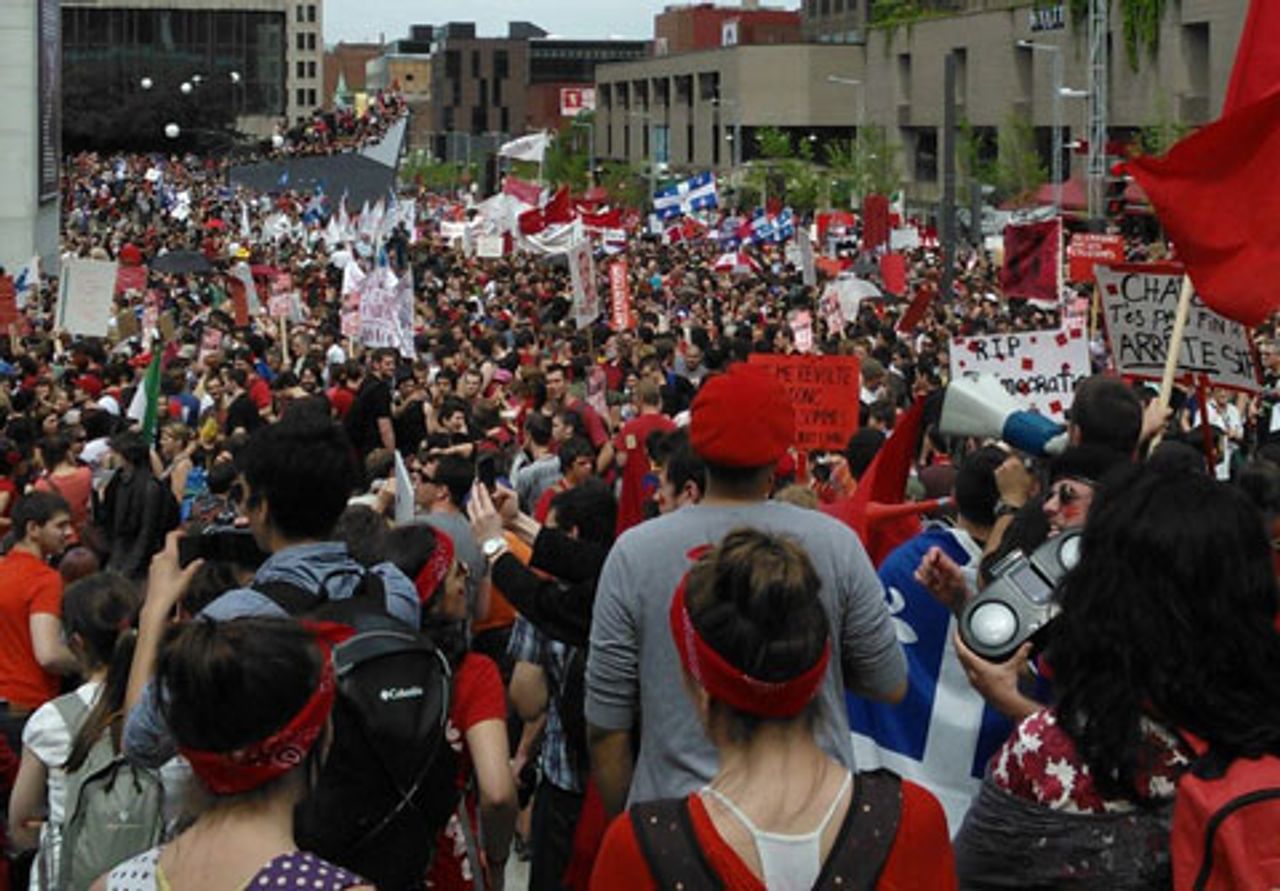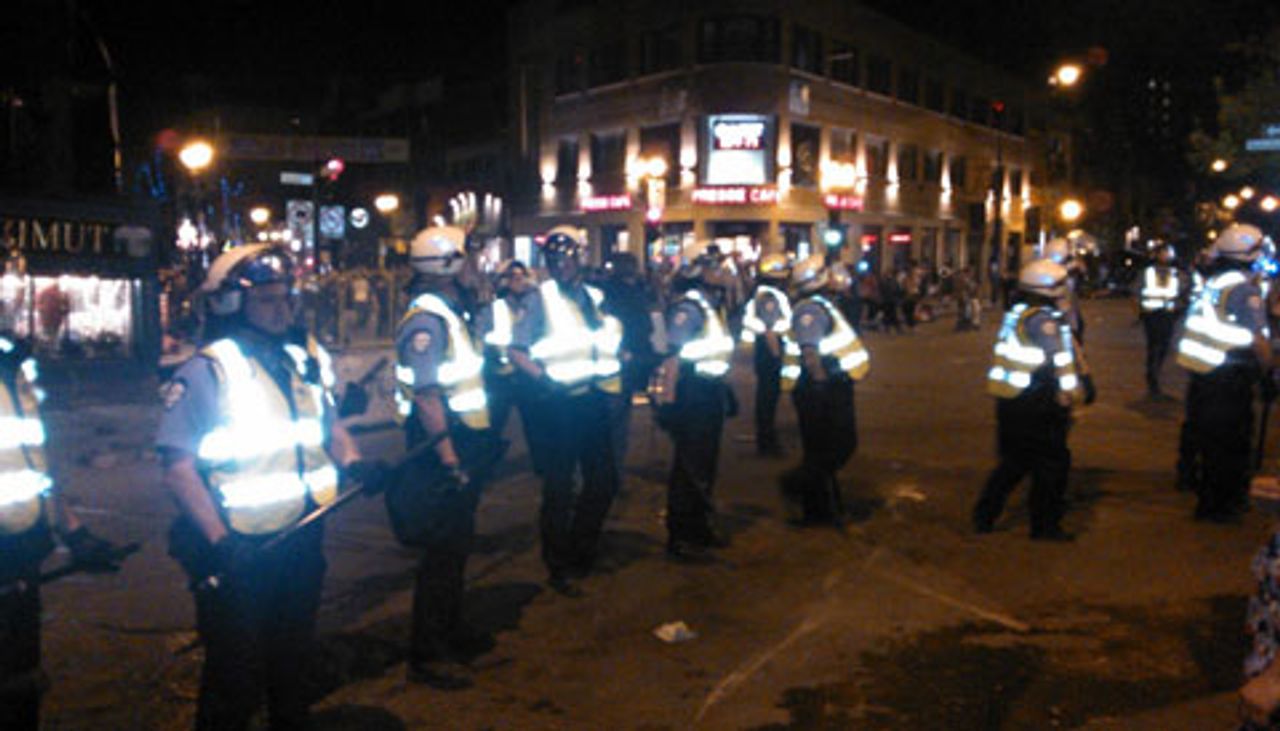Quebec: Huge protest supports striking students, denounces Bill 78
*More than 100,000 people took to the streets of Montreal yesterday to mark the 100th day since the beginning of the Quebec student strike and to denounce the Quebec Liberal government’s Bill 78.
Adopted in less than 24 hours late last week, Bill 78 criminalizes the student strike by outlawing picket lines anywhere in the vicinity of the province’s universities and CEGEPs (pre-university and technical colleges) and by threatening teachers with criminal prosecution and massive fines if they make any accommodations to striking students or fail to perform all of their normal functions.

“No to austerity for the people to finance the prosperity of the rich,” reads the middle of the three hand-made placards in the foreground of this photo
Bill 78 also places sweeping restrictions on the right to demonstrate anywhere—and over any issue—in Canada’s second most populous province. Any demonstration of more than 50 people is illegal unless demonstration organizers submit to police in writing more than eight hours in advance the route and duration of the protest and abide by any changes requested by the police. Demonstration organizers are also legally compelled to assist the authorities in ensuring that protesters do not transgress the police-prescribed protest route.
The same day the Liberals rammed Bill 78 through the National Assembly, Montreal’s municipal government, meeting in special session, adopted its own emergency bylaw compelling police authorization for demonstration-routes and making it illegal to wear any form of face covering—including face-paint, a nijab, or a scarf—while participating in a demonstration.
Quebec’s corporate elite has strongly supported Bill 78, just as it has the government’s insistence that its plan to raise university tuitions by 82 percent over the next seven years is non-negotiable.
The huge turnout for Tuesday’s demonstration is testimony to the widespread support for the students and recognition that Bill 78 constitutes a sweeping attack on the democratic rights of all.
 The demonstrators denounced Bill 78 as an assault on the democratic rights of all
The demonstrators denounced Bill 78 as an assault on the democratic rights of all
There were numerous hand-made placards denouncing Bill 78. One read, “Academic Freedom=Free Speech and Free Assembly”; another “Bill 78, May 68”; a third, “A government that uses repression is a government that is afraid. We won’t give up.”
While students comprised the majority of the protesters, there were also large numbers of workers, a significant contrast from the massive province-wide demonstration in support of the student strike held in Montreal on March 22. There were union delegations, including of teachers, and Montreal blue-collar and transit workers. But most of the workers did not appear to have come as part of an organized contingent. Some were recent university or CEGEP graduates, others retirees.
Midway through yesterday’s march, CLASSE (The Broader Coalition of the Association for Student-Union Solidarity)—the province-wide student association that initiated the current student strike—broke away from the police-approved march itinerary and led tens of thousands on an alternate course through downtown Montreal, briefly paralyzing rush-hour traffic. Police did not intervene.
The breakaway march was meant to exemplify CLASSE’s vow, announced Monday after a meeting of its leadership, that it will not submit to Bill 78. “We believe our fundamental rights should take precedence over respecting an unjust law,” announced CLASSE spokesman Gabriel Nadeau-Dubois. “The Liberal government talks about intimidation since the beginning of the conflict. But with this law as it is, it is practicing intimidation.”

Police were out in force in Montreal last weekend, arresting more than 450 people during evening protests in support of the student strike
CLASSE’s defiance, however, is not from the standpoint of making the students’ strike the catalyst for the mobilization of the working class against the austerity program of the Liberal government and of the Quebec and Canadian ruling class as a whole. Rather it is entirely within the framework of a single-issue protest aimed at pressuring Premier Jean Charest and his Liberal government into a negotiated settlement—a perspective typified by the refrain taken up by many of yesterday’s demonstrators, “Criions plus fort que personne nous ignores” (Shout louder so that nobody can ignore us.)
On the basis of this perspective, CLASSE negotiators already put their signatures to an entente with the government—later massively repudiated by the students—that imposed the tuition fee increases in full and would have established a government-business dominated tri-partite committee to cut university spending.
Although police did not immediately intervene to arrest CLASSE leaders for defying Bill 78, Justice Minister Jean-Marc Fournier emphasized that the government will not tolerate civil disobedience. “Civil disobedience,” he declared, “is a nice word for vandalism.”
Later Tuesday the state struck back, invoking for the first time the draconian provisions of Bill 78.
For almost four weeks there have been nightly demonstrations in Montreal in support of the students. On Tuesday evening, no sooner had protesters converged on the park that has become the starting point for these nightly protests, than police declared the gathering illegal under Bill 78, since demonstrators had not obtained police sanction for the demonstration.
This clearly was done with a double purpose. First to show that notwithstanding yesterday’s massive protest, the government intends to pursue its campaign to forcibly break the student strike. Second, to provoke a violent confrontation that could be used to drown out coverage of yesterday’s massive march and provide grist for the government-corporate media campaign tarring the students as violent.
Unlike, CLASSE, the other two province-wide student associations, FECQ (Quebec Federation of College Students) and FEUQ (Quebec Federation of University Students), have declared they will comply with Bill 78, while contesting its constitutionality in the courts.
FECQ and FEQ, which have close ties to the trade union bureaucracy, are also placing renewed emphasis upon their campaign to defeat the government at the next election. The call for students to pursue their strike at the ballot box is a transparent attempt to boost the electoral fortunes of the big business Parti Quebecois, a party which when it last held office instituted the greatest social spending cuts in Quebec history, then slashed taxes for big business and the most privileged sections of the population.
The trade unions have denounced Bill 78 as a grievous attack on democratic rights, but also said that they will comply with the law, which stipulates that they use all means at their disposal to ensure that teachers and other university and CEGEP employees assist the government in breaking the student strike. Earlier the unions played a major role in pressuring the student associations to accept the sellout entente that was subsequently repudiated by the students.
At yesterday’s march supporters of the Socialist Equality Party and the International Students for Social Equality distributed a thousand copies of a statement titled “Faced with state repression, students must turn to the working class.”
It read in part: “The passage of Bill 78, which criminalizes the student strike and tramples on the right to demonstrate, shows that the ruling class is ready to use authoritarian and anti-democratic methods to impose its class program—the dismantling of public services and the impoverishment of broad layers of the population.
“This assault on living standards and democratic rights cannot be repelled by single-issue protests, no matter how militant.
“What is required is the independent mobilization of the working class, in opposition to the pro-capitalist unions, in a counter-offensive against government social spending cuts, the destruction of jobs and wage cuts. Such a mobilization must be part of a political struggle uniting the working class, French- and English-speaking and immigrant, in Quebec and across Canada in the fight for a workers’ government. Such a government would use the vast resources created by workers’ collective labor to meet the social needs of all, not fill the pockets of a tiny capitalist elite.”

